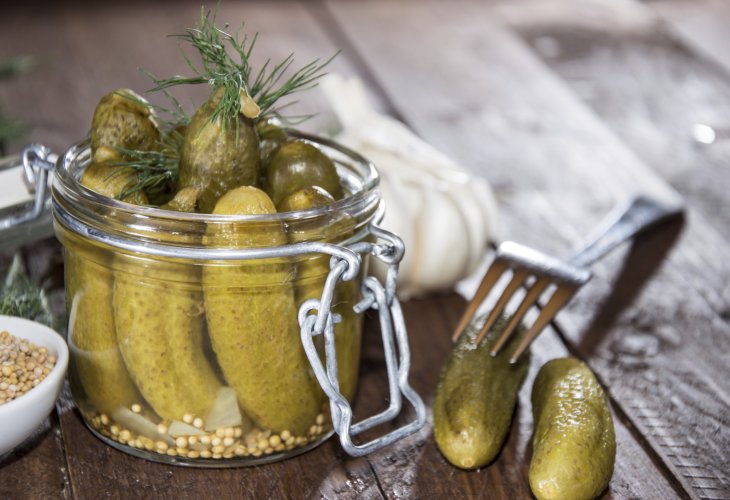Partial Tithing: A Predetermined Solution
Israeli produce that changes ownership creates a serious problem. How? Hundreds of cucumbers in a box, some requiring tithing and some not – what to do? The creative solutions of kashrut supervisors

Many of us are accustomed to buying popular branded food products without having any idea who the owners or manufacturers behind the product are. It's very likely that in your pantry there are numerous canned goods with very Israeli names, but their manufacturers are simply our cousins from beyond the Green Line. Sometimes this is even beneficial, because their Jewish desire for profit overcomes them to such an extent that they become exceptionally obedient to kashrut instructions. However, on the other hand, it's important to know that dealing with them creates complex problems requiring very creative solutions, such as in matters of separating tithes and offerings.
First, let's preface: every fruit and vegetable has a stage that marks the end of its growth, a time when the processes of preparing the fruit for consumption are completed, even if the fruit is not necessarily actually ready for consumption. This stage is called in our sages' language the time of smoothing (miru'ach), and once that time arrives, the obligation to separate tithes and offerings from the fruits or vegetables applies. As long as tithes and offerings haven't been separated from them, they are considered tevel fruits, forbidden for consumption. However, all this is on condition that the fruits grew in the Land of Israel and were under Jewish ownership at that stage. But if the fruits grew outside of Israel, or even if they grew in the Land of Israel but the owners of the fruits were non-Jews at that time, there is no obligation to separate tithes and offerings from the fruits.
This also applies in the opposite case. For example, produce from a Jewish farmer growing in the fields of the Land of Israel, where the produce was gathered and collected by him, and passed the final stage that obligates it in the separation of tithes and offerings, but after that stage the goods were sold to a non-Jew – there is still a tithing obligation on the fruits, and it is forbidden for a Jew to purchase them for consumption without first separating tithes and offerings. This is important information for many buyers of pomegranate juice sold near the Western Wall, and also for those who stop by the roadsides to buy seasonal fruits sold by our Ishmaelite cousins, without realizing that the produce is not necessarily from their fields.
Now let's present an interesting question.
Pickled cucumber preserves – A fairly large portion of the canning factories are owned by non-Jews, but they purchase the contents for their cans, such as cucumbers, directly from Jewish growers to save on middleman costs. This creates a situation where tevel cucumbers, from which tithes and offerings have not yet been separated, enter the factory gates and are marketed in cans without any concern of tevel. But it's not at all clear how the prohibition of tevel was removed from them, since no one can separate tithes and offerings from them. The Jewish farmer – has already sold his merchandise and is no longer the owner who could separate. The non-Jewish factory owner – cannot separate and would only be performing a meaningless act. The kashrut supervisor – lacks authority in such a case, because the factory owner is a non-Jew and from a halachic perspective cannot appoint him as an agent, and therefore even if he decides on his own to separate, it won't help at all... So a problem arose: on one hand, fruits that require separation of tithes and offerings, and on the other hand, no one who can separate from them.
When this case came before the Badatz Beit Yosef, some thought that perhaps it would be better to arrange with the Jewish farmers not to transfer ownership of the fruits to the non-Jew's factory until after the supervisor, as the farmer's agent, has separated tithes and offerings – a good idea, but with several drawbacks. The best way, established by the head of the Badatz, Rabbi M. Yosef shlita, is to create a situation where the factory ownership transfers to the kashrut organization, and the tithing supervisor is an agent of Jews. However, for the factory or that merchandise to pass from non-Jewish ownership to Jewish ownership, a deed of acquisition must be drawn up with much halachic knowledge about how and by what form of acquisition one buys from a non-Jew. But after the acquisition and the kashrut organization's partnership in the factory, the path is very short to the notation "no concern of tevel, tithes and offerings have been separated."
Preserved pickled olives - What is the law regarding olives that are pickled in these factories? There were those who thought that there is no obligation to separate tithes and offerings from them, since the final stage that requires separation of tithes and offerings was done in the non-Jew's factory.
In practice, today we are stringent to separate tithes and offerings from them according to the same arrangement used in other preserves, and this is due to the ruling of the glory of our generation, Maran zt"l, that the completion of work that obligates olives in the separation of offerings, even when they are bitter, is still before they come to the factory, like all other crops that require separation from the time they are collected from the orchards.

